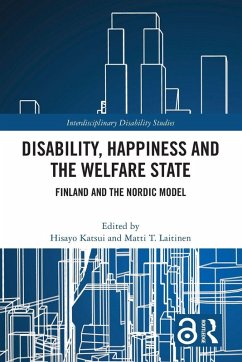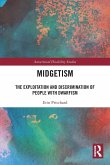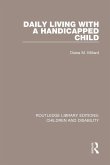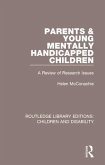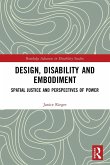Disability, Happiness and the Welfare State
Finland and the Nordic Model
Herausgeber: Katsui, Hisayo; Laitinen, Matti T.
Disability, Happiness and the Welfare State
Finland and the Nordic Model
Herausgeber: Katsui, Hisayo; Laitinen, Matti T.
- Broschiertes Buch
- Merkliste
- Auf die Merkliste
- Bewerten Bewerten
- Teilen
- Produkt teilen
- Produkterinnerung
- Produkterinnerung
This book looks at disability as an evolving social phenomenon.
Andere Kunden interessierten sich auch für
![The Disabled Schoolchild The Disabled Schoolchild]() Anderson Elizabeth M.The Disabled Schoolchild51,99 €
Anderson Elizabeth M.The Disabled Schoolchild51,99 €![Caring for the Mentally Handicapped Child Caring for the Mentally Handicapped Child]() David WilkinCaring for the Mentally Handicapped Child46,99 €
David WilkinCaring for the Mentally Handicapped Child46,99 €![The Practical Accomplishment of Everyday Activities Without Sight The Practical Accomplishment of Everyday Activities Without Sight]() The Practical Accomplishment of Everyday Activities Without Sight58,99 €
The Practical Accomplishment of Everyday Activities Without Sight58,99 €![Midgetism Midgetism]() Erin PritchardMidgetism55,99 €
Erin PritchardMidgetism55,99 €![Daily Living with a Handicapped Child Daily Living with a Handicapped Child]() Diana M. MillardDaily Living with a Handicapped Child32,99 €
Diana M. MillardDaily Living with a Handicapped Child32,99 €![Parents and Young Mentally Handicapped Children Parents and Young Mentally Handicapped Children]() Helen McconachieParents and Young Mentally Handicapped Children32,99 €
Helen McconachieParents and Young Mentally Handicapped Children32,99 €![Design, Disability and Embodiment Design, Disability and Embodiment]() Janice RiegerDesign, Disability and Embodiment56,99 €
Janice RiegerDesign, Disability and Embodiment56,99 €-
-
-
Produktdetails
- Produktdetails
- Verlag: Routledge
- Seitenzahl: 290
- Erscheinungstermin: 30. Juli 2025
- Englisch
- Abmessung: 234mm x 156mm x 16mm
- Gewicht: 445g
- ISBN-13: 9781032685502
- ISBN-10: 1032685506
- Artikelnr.: 74442798
- Herstellerkennzeichnung
- Libri GmbH
- Europaallee 1
- 36244 Bad Hersfeld
- gpsr@libri.de
- Verlag: Routledge
- Seitenzahl: 290
- Erscheinungstermin: 30. Juli 2025
- Englisch
- Abmessung: 234mm x 156mm x 16mm
- Gewicht: 445g
- ISBN-13: 9781032685502
- ISBN-10: 1032685506
- Artikelnr.: 74442798
- Herstellerkennzeichnung
- Libri GmbH
- Europaallee 1
- 36244 Bad Hersfeld
- gpsr@libri.de
Hisayo Katsui is Professor in Disability Studies at the University of Helsinki. She is a permanent expert to the Finnish Advisory Board for the Rights of Persons with Disabilities and a board member of the Nordic Network of Disability Research and the Finnish Society for Disability Research. Her research interests are disability rights realisation in practice and participatory research approaches. Matti T. Laitinen is a senior lecturer at the Faculty of Educational Sciences, University of Helsinki. His research interests lie in disability, inclusive education and the life stories of persons with disabilities. Laitinen identifies as a disabled person and he has been involved in the disability right movement since 1987.
0.Introduction. 1.The sense of difference: Disability and loneliness as
emotional and social isolation. 2.'Disability is so invisible at the
University'--Disability Inclusion/Exclusion Experiences of Students with
Disabilities at the University of Helsinki. 3.Being independently
dependent- Experiences at the intersection of disability and old age in
Finland. 4.One step backward? Exploring the outcomes of the COVID-19
pandemic for persons with intellectual disabilities in supported and
service housing. 5.The state of inclusion in the state of inclusion?
Inclusion as principled practice in Finnish basic education. 6.Media
Representations of Disability. 7.Reforming disability services to balance
rights and needs. 8.Employment, the Finnish disability pension system, and
self-determination of people with intellectual and developmental
disabilities. 9.The happiness of having a hobby: Inclusion of persons with
disabilities in leisure activities. 10.Spiral of progress: Disability
activists' perception of the societal and political position of disabled
people in Finland. 11."Second Class Citizens" - Challenges with Truth and
Reconciliation Process of Deaf People and the Sign Language Community in
Finland. 12.Examining cooperation-based advocacy between government and
disability activists in transnational advocacy networks. x.Concluding
Remarks.
emotional and social isolation. 2.'Disability is so invisible at the
University'--Disability Inclusion/Exclusion Experiences of Students with
Disabilities at the University of Helsinki. 3.Being independently
dependent- Experiences at the intersection of disability and old age in
Finland. 4.One step backward? Exploring the outcomes of the COVID-19
pandemic for persons with intellectual disabilities in supported and
service housing. 5.The state of inclusion in the state of inclusion?
Inclusion as principled practice in Finnish basic education. 6.Media
Representations of Disability. 7.Reforming disability services to balance
rights and needs. 8.Employment, the Finnish disability pension system, and
self-determination of people with intellectual and developmental
disabilities. 9.The happiness of having a hobby: Inclusion of persons with
disabilities in leisure activities. 10.Spiral of progress: Disability
activists' perception of the societal and political position of disabled
people in Finland. 11."Second Class Citizens" - Challenges with Truth and
Reconciliation Process of Deaf People and the Sign Language Community in
Finland. 12.Examining cooperation-based advocacy between government and
disability activists in transnational advocacy networks. x.Concluding
Remarks.
0.Introduction. 1.The sense of difference: Disability and loneliness as
emotional and social isolation. 2.'Disability is so invisible at the
University'--Disability Inclusion/Exclusion Experiences of Students with
Disabilities at the University of Helsinki. 3.Being independently
dependent- Experiences at the intersection of disability and old age in
Finland. 4.One step backward? Exploring the outcomes of the COVID-19
pandemic for persons with intellectual disabilities in supported and
service housing. 5.The state of inclusion in the state of inclusion?
Inclusion as principled practice in Finnish basic education. 6.Media
Representations of Disability. 7.Reforming disability services to balance
rights and needs. 8.Employment, the Finnish disability pension system, and
self-determination of people with intellectual and developmental
disabilities. 9.The happiness of having a hobby: Inclusion of persons with
disabilities in leisure activities. 10.Spiral of progress: Disability
activists' perception of the societal and political position of disabled
people in Finland. 11."Second Class Citizens" - Challenges with Truth and
Reconciliation Process of Deaf People and the Sign Language Community in
Finland. 12.Examining cooperation-based advocacy between government and
disability activists in transnational advocacy networks. x.Concluding
Remarks.
emotional and social isolation. 2.'Disability is so invisible at the
University'--Disability Inclusion/Exclusion Experiences of Students with
Disabilities at the University of Helsinki. 3.Being independently
dependent- Experiences at the intersection of disability and old age in
Finland. 4.One step backward? Exploring the outcomes of the COVID-19
pandemic for persons with intellectual disabilities in supported and
service housing. 5.The state of inclusion in the state of inclusion?
Inclusion as principled practice in Finnish basic education. 6.Media
Representations of Disability. 7.Reforming disability services to balance
rights and needs. 8.Employment, the Finnish disability pension system, and
self-determination of people with intellectual and developmental
disabilities. 9.The happiness of having a hobby: Inclusion of persons with
disabilities in leisure activities. 10.Spiral of progress: Disability
activists' perception of the societal and political position of disabled
people in Finland. 11."Second Class Citizens" - Challenges with Truth and
Reconciliation Process of Deaf People and the Sign Language Community in
Finland. 12.Examining cooperation-based advocacy between government and
disability activists in transnational advocacy networks. x.Concluding
Remarks.

